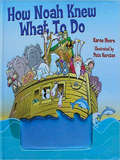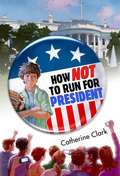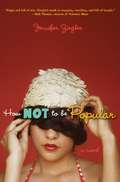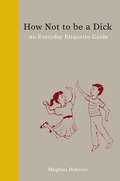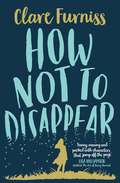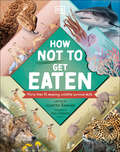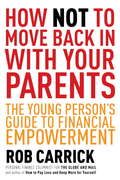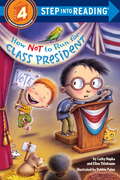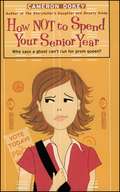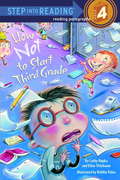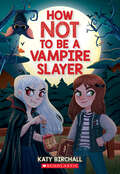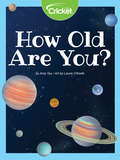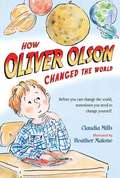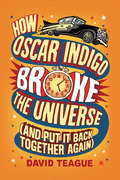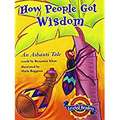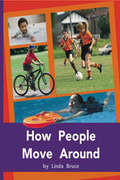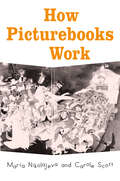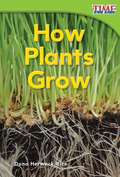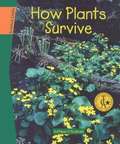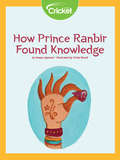- Table View
- List View
How Noah Knew What to Do
by Karen Ann MooreChildren are often afraid to try something new. This story will show them how they can trust God to help them do what they need to do--just like He did Noah. How Noah Knew What to Do shows how, even though Noah wasn't a veterinarian or even a ship builder, he listened to God and trusted Him to help him build the ark and fill it with animals. Karen Ann Moore's delightful rhyming text along with Pete Kersten's whimsical illustrations make this a fun way for children to learn they can rely on God in every situation, even when they're doing something they've never done before. Kids will see that obeying God can mean saying "yes" even when the obstacles seem hard to overcome. A gel-pack water-waves novelty that's built into the front cover makes for lots of giggles.
How Not To Run For President
by Catherine Clark"Humorous dialogue, smart pacing and some dirty politics make for an engaging read. With an election around the corner, this isn’t a bad way for young readers to view the political arena. "-Kirkus Reviews When the middle school band is called to play for a presidential campaign rally, Aidan is right there with his clarinet, just in time to save the candidate’s life. Interviewed by the media, he speaks up in favor of the need to save jobs-like his mom’s, for instance. Even though he’s in the middle of Little League season, for pete’s sake, the candidate convinces him to join her tour of the midwest. Problem 1: The candidate’s daughter HATES Aidan. Problem 2: What do you do when your whole life has been turned upside down and you can’t get away from the media? Problem 3: What’s a red-blooded American boy to do when he’s asked to play the clarinet on national TV and the local bully back home is giving interviews saying Aidan’s the nerd of the century?
How Not to Be Popular
by Jennifer ZieglerMaggie Dempsey is tired of moving all over the country. Her parents are second-generation hippies who uproot her every year or so to move to a new city. When Maggie was younger, she thought it was fun and adventurous. Now that she’s a teenager, she hates it. When she moved after her freshman year, she left behind good friends, a great school, and a real feeling of belonging. When she moved her sophomore year, she left behind a boyfriend, too. Now that they’ve moved to Austin, she knows better. She...
How Not to Be a Dick
by Meghan DohertyOn the one hand, nobody wants to be a dick. On the other hand, dicks are everywhere! They cut in line, talk behind our backs, recline into our seats, and even have the power to morph into trolls online. Their powers are impressive, but with a little foresight and thoughtfulness, we can take a stand against dickishness today. How Not to Be a Dick is packed with honest and straightforward advice, but it also includes playful illustrations showing two well-meaning (but not always well behaved) young people as they confront moments of potential dickishness in their everyday lives. Sometimes they falter, sometimes they triumph, but they always seek to find a better way. And with their help, you can too.
How Not to Disappear
by Clare FurnissOur memories are what make us who we are. Some are real. Some are made up. But they are the stories that tell us who we are. Without them we are nobody. Hattie's summer isn't going as planned. Her two best friends have abandoned her: Reuben has run off to Europe to 'find himself" and Kat is in Edinburgh with her new girlfriend. Meanwhile Hattie is stuck babysitting her twin siblings and dealing with endless drama around her mum's wedding. Oh, and she's also just discovered that she's pregnant with Reuben's baby...Then Gloria, Hattie's great-aunt who no one even knew existed, comes crashing into her life. Gloria's fiercely independent, rather too fond of a gin sling and is in the early stages of dementia. Together the two of them set out on a road trip of self-discovery - Gloria to finally confront the secrets of her past before they are erased from her memory forever and Hattie to face the hard choices that will determine her future... Non Pratt's Trouble meets Thelma and Louise with a touch of Elizabeth is Missing by Emma Healey, Clare Furniss' remarkable How Not To Disappear is an emotional rollercoaster of a novel that will make you laugh and break your heart.
How Not to Get Eaten: More than 75 Incredible Animal Defenses (Wonders of Wildlife )
by Josette ReevesFor many animals, life is a constant battle to stay off a predator&’s menu. So they&’ve had to come up with lots of cunning ways to avoid being eaten.From camouflage and color-changing, natural armor, playing dead, great escapes, detachable body parts, and impressive ways of fighting back, the range of survival tactics in the natural world is quite astonishing (and sometimes pretty disgusting). How Not To Get Eaten is a fun introduction to the ingenious antipredator strategies in the natural world. Discover how meerkats post sentries to guard their homes and possums play dead, to how mimic octopuses change their shape and bombardier beetles unleash a chemical weapon attack. Perfect for children aged 7–9, the book is filled with intriguing illustrations and spectacular photographs of the amazing, obscure, and incredibly strange. You'll never look at nature the same way again!
How Not to Move Back in With Your Parents
by Rob CarrickIn this era of the Boomerang Generation, here at last is a full and frank guide to avoiding the need to move back in with your parents. Rob Carrick of The Globe and Mail is one of Canada's most trusted and widely read financial experts. His latest book is the first by anyone to target financial advice specifically at young adults graduating from university or college and moving into the workforce, into the housing market and into family life. Financial beginners, in other words. Carrick offers what can only be described as a wealth of information, on the full life cycle of financial challenges and opportunities young people face, including saving for a post-secondary education and paying off student debts, establishing a credit rating, basic banking and budgeting, car and home buying, marriage and raising children of their own, and insurance. The book is mindful throughout that parents have a big role to play in all this. It addresses young readers throughout but regularly asks them to see things from their parents' perspective. In that way, Rob Carrick is able to offer advice to both generations. He even recognizes that in these difficult times, moving back in with the folks is sometimes a short-term necessity. So there is a section devoted to such important questions as: Should your parents be charging you rent? For that and many thousands of dollars' worth of other reasons, this is a book that every parent needs to buy for each of their kids, plus one for themselves.From the Trade Paperback edition.
How Not to Run for Class President
by Debbie Palen Ellen Vandenberg Catherine A. HapkaLooking for a fun, light introduction to the campaign process? Join the brothers from the How Not to . . . series as they navigate a class election! Third grader Will couldn't care less about boring school politics. But when his friend Chelsea proposes a Reading Buddy program that would require Will to hang out with the kindergartners (and therefore his little brother, Steve), he makes an impulsive decision to run against her! Supportive brother that he is, Steve takes full responsibility for managing his brother's campaign . . . and things quickly spiral out of control. This fun reader gently teaches what it means to be a responsible politician, and even gets some election basics into the mix. A hilarious tool to kick off classroom units on elections! Step 4 Readers use challenging vocabulary and short paragraphs to tell exciting stories. These books are for newly independent readers who read simple sentences with confidence.From the Trade Paperback edition.
How Not to Spend Your Senior Year
by Cameron DokeyRule #1: If at all possible, don't pretend to be something you're not. Specifically, don't play dead. Trust me on this one. I did it, so I should know. Jo O'Connor has spent her whole life moving around. When it comes to new schools, there's not a trick in the book about starting over that Jo doesn't know. But life is about to teach her a new trick: how to disappear entirely. Rule #2: Always expect the Spanish Inquisition, no matter what anyone else does. They have to move again. Now. This very night. Jo knows better than to argue. Her dad is the key witness in a major case against a big-time bad guy. But Jo just can't resist one last visit to the school where she's been so happy. All she wants is to say good-bye. That can't cause any problems, can it? Rule #3: Never assume you can predict the future. Now Jo's one last visit has landed her smack in the middle of a ghost story. Specifically, her own. By the time it's over, she'll have a whole new set of rules about what's real, what's make-believe, and--most of all--what's important.
How Not to Start Third Grade (Step into Reading)
by Cathy Hapka Debbie Palen Ellen TitlebaumWill should be excited to start third grade. But his little brother, Steve, is starting kindergarten. The same laugh-out-loud writing and hilarious illustrations that brought us How Not to Babysit Your Brother now portray the tribulations and embarrassments of starting school with a very troublesome little brother. School will never be the same!Cathy Hapka and Ellen Titlebaum are the authors of many books for children. This is their second book about Will and Steve. They live in Lincoln University, Pennsylvania, and New York City, respectively.Debbie Palen has illustrated many books for children, including How Not to Babysit Your Brother and the first four books in the Andrew Lost series. She lives in Cleveland, Ohio.
How Not to be a Vampire Slayer
by Katy BirchallBuffy the Vampire Slayer meets The Witchlings in a hilarious, heartfelt story about a reluctant vampire slayer... and her vampire best friend.Maggie Helsby isn't afraid of much. But one thing that terrifies her is trying to fit in.When she moves to the small town of Goreway, she's eager to shed her old reputation as the weird horror nerd who scares the other kids at school. This time it'll be different. The only problem is that she's moved into a spooky house at the edge of Skeleton Woods, gifted to her parents by a mysterious great uncle she never knew. She can't resist exploring it before the townspeople tear down the forest and build a golf course, even if her new friends are too scared to follow her...What she finds is Skeleton Lodge, the headquarters of a secret coven of vampires, their evil leader Count Bloodthirst, and a young vampire named Sharptooth Shadow who SWEARS she's a vegetarian. She might just be the friend Maggie's been dying to meet! But when Maggie discovers that she descends from a long line of vampire slayers, can she and Sharptooth overcome their history and save the forest and their friendship?
How Old Are You?
by Amy TaoWhen it’s your birthday, you add one Earth year to your age. Have you ever wondered how old you would be in Saturn years? What about Mars? Read on to learn about the planets of our solar system and how long it takes for them to complete one whole orbit.
How Oliver Olson Changed the World
by Claudia MillsAfraid he will always be an outsider like ex-planet Pluto, nine-year-old Oliver finally shows his extremely overprotective parents that he is capable of doing great things without their help while his class is studying the solar system.
How Oscar Indigo Broke the Universe (And Put It Back Together Again)
by David Teague★ "Suspend all disbelief and enjoy." —Kirkus (starred review)From David Teague, the coauthor of the critically acclaimed Saving Lucas Biggs, comes a funny and sweet story about learning to have courage even when it feels like the world is ending.Oscar Indigo has never been good at baseball, so naturally he’s nervous when he has to fill in for his team’s injured All-Star, Lourdes. Luckily, Oscar has a mysterious gold watch that can stop time, which he uses to fake a game-winning home run. Now Oscar’s the underdog hero of his town and even Lourdes wants to be his friend. But the universe is a precarious place, and you can’t just steal time without any consequences. If Oscar doesn’t find a way to return the time he stole, the universe will unwind completely. Oscar wants nothing more than to ask Lourdes for help, but what would a baseball star like her think of a guy whose fake home run actually destroyed the universe? But as he and Lourdes grow closer, Oscar understands that it isn’t always what you do that makes you special—but who you are. And that confidence just might be the key to fixing the universe.
How Our Eyes See (How Our Bodies Work)
by Carol BallardHave you ever wondered how you can see the stars and watch your favorite football team on television? Find out how the eyes work and how they provide information about the world around us.
How People Got Wisdom: An Ashanti Tale (Leveled Readers 4FOG)
by Benjamin KhanA folk tale of how Anansi, a spider, brought wisdom to the world.
How People Learned to Fly
by Fran HodgkinsIn this book you find out about the many obstacles that have been overcome so planes and people can soar through the sky. <P><P>[This text is listed as an example that meets Common Core Standards in English language arts for K-1 at http://www.corestandards.org.]
How People Move Around (Rigby PM Plus Blue (Levels 9-11), Fountas & Pinnell Select Collections Grade 3 Level Q)
by Linda BruceHow People Move Around by Linda Bruce
How Picturebooks Work (Children's Literature and Culture #14)
by Maria Nikolajeva Carole ScottHow Picturebooks Work is an innovative and engaging look at the interplay between text and image in picturebooks. The authors explore picturebooks as a specific medium or genre in literature and culture, one that prepares children for other media of communication, and they argue that picturebooks may be the most influential media of all in the socialization and representation of children. Spanning an international range of children's books, this book examine such favorites as Curious George and Frog and Toad Are Friends, along with the works of authors and illustrators including Maurice Sendak and Tove Jansson, among others. With 116 illustrations, How Picturebooks Work offers the student of children's literature a new methodology, new theories, and a new set of critical tools for examining the picturebook form.
How Pizza Came to Queens
by Dayal Kaur KhalsaAn Italian visitor to Queens bemoans the unavailability of pizza until some thoughtful girls enable her to make some.
How Plants Grow (Time For Kids®: Informational Text)
by Dona Herweck RiceBeginning readers explore the steps to make plants grow! Readers will learn about various parts of the plant including seeds, roots, and leaves in this engaging nonfiction title. Featuring vivid, clear photos and simple, informational text, even the most reluctant reader will be captivated!
How Plants Survive (Science Links)
by Kathleen V. KudlinskiPlants compete with one another for sunshine and water, and they struggle to protect their own patch of soil. Find out how plants wage a constant battle for survival.
How Prince Ranbir Found Knowledge
by Deepa AgarwalPrince Ranbir is not very wise. No matter what scholar his father brings to teach him, he never seems to learn. To help him gain more knowledge, the king sends his son on a journey through India. Will Ranbir’s adventures help him gain the knowledge and wisdom he needs to become a good monarch?
How Proudly They Wave: Flags of the Fifty States
by Rita D. HabanFrom the Book Jacket: Did you know that Alaska's state flag was designed by a 13-year-old boy, or that California's first flag was made from a lady's petticoat? Each state flag tells a story through its design, and some of the stories are very interesting. In this book, Rita Haban introduces you to the 50 state flags. She tells the stories of their origins and explains the historical meaning of each emblem. Clear, colorful, detailed illustrations, supplied by the Flag Research Center in Winchester, Massachusetts, show the flags of each state. This is a first book for Rita Haban. Her interest in history stems from her own childhood, when a seventh grade teacher sparked her students' interest by illustrating history lessons on the blackboard. Haban studied English at Ohio State University. A member of the Society for Children's Book Writers, Haban also writes short stories and poetry. Two of her poems were published in the Ohio poetry awards, The Best of 1983. She and her family live in Reynoldsburg, Ohio.
